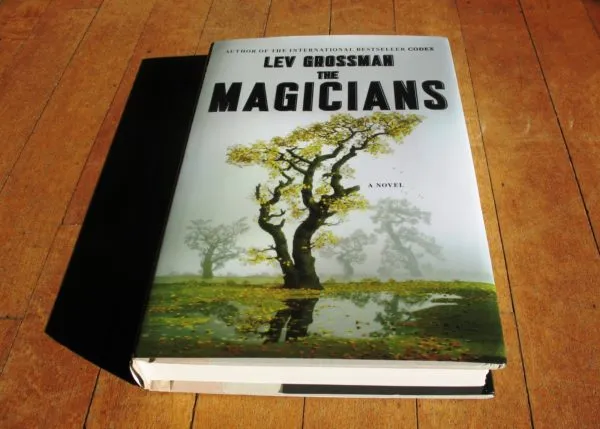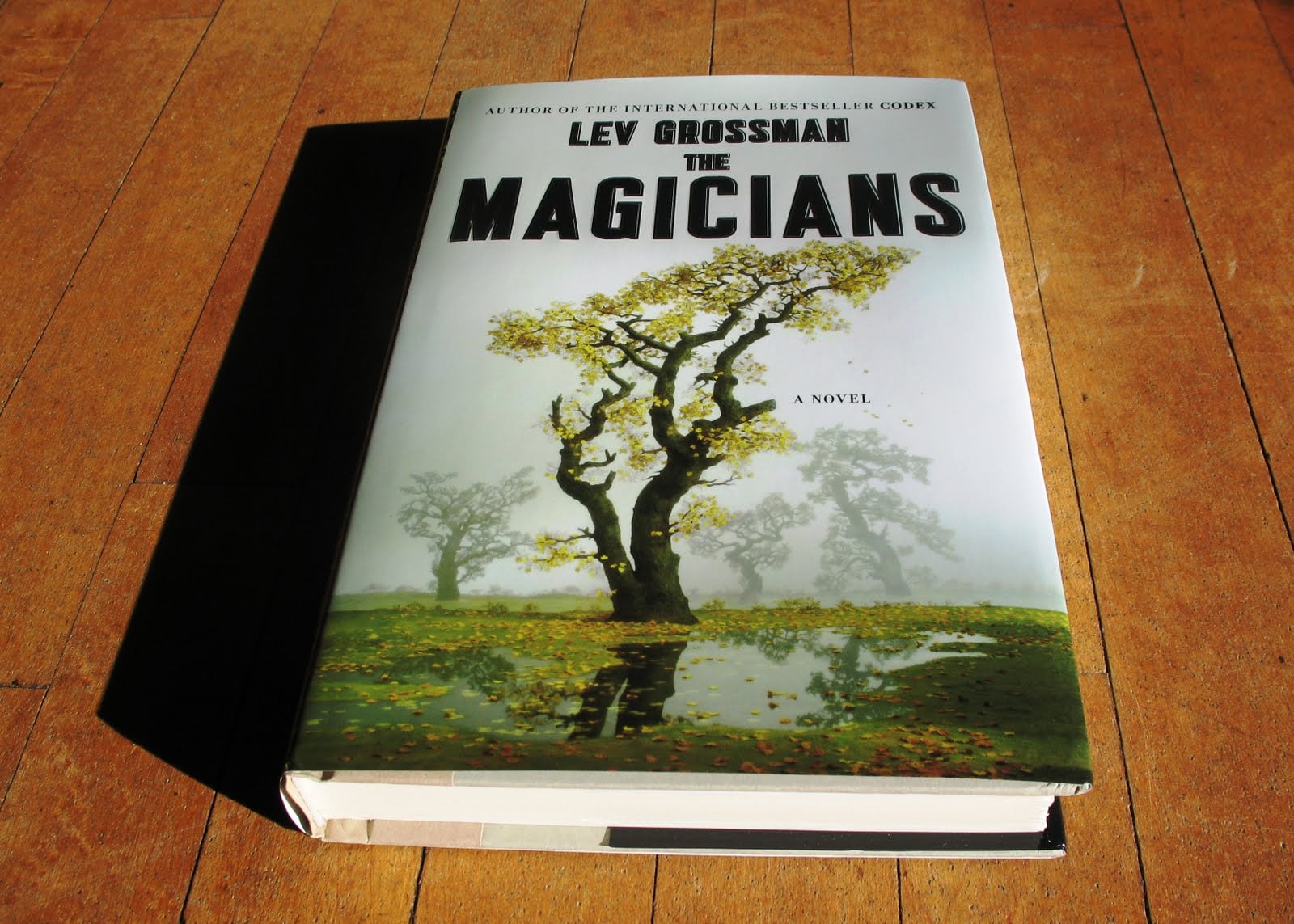
Warning: This article contains spoilers for Lev Grossman’s “The Magicians.”
“It does not do to dwell on dreams and forget to live.”
Albus Dumbledore bestows this wisdom on an 11-year-old Harry Potter in “Harry Potter and the Sorcerer’s Stone,” when Harry is in danger of developing an obsession with the Mirror of Erised, a magical artifact that reveals the viewer’s deepest desire. Harry sees his dead parents, and he must learn to prioritize the life he has over the life he lost. It’s a lesson that Quentin Coldwater, the 18-year-old protagonist of Lev Grossman’s urban fantasy novel, “The Magicians,” would do well to learn.
“The Magicians,” originally released in 2009 and now a successful television series on Syfy, is critically acclaimed; even George R.R. Martin, the current king of fantastic epics, enthuses on the back of the book, “‘The Magicians’ is to ‘Harry Potter’ as a shot of Irish whiskey is to a glass of weak tea… Hogwarts was never like this.” Naturally, that quote was catnip to my little Ravenclaw heart; I snatched “The Magicians” up and deposited it on top of my textbooks, where it patiently sat until winter break. As somebody deeply shaped by fantasy both in my youth – I grew up on the medieval worlds of McKinley’s “The Blue Sword” and Pierce’s “Protector of the Small,” the criminal master plans of “Artemis Fowl” and the magical tongues of “Inkheart,” the allegorical escapism of “Alice’s Adventures in Wonderland” and “The Chronicles of Narnia,” and, of course, “Harry Potter” – and by more modern, darker variants of fairy tales like the works of Neil Gaiman, “The Magicians” and I seemed like a straightforward match.
“The Magicians” is the story of Quentin Coldwater, a math-prodigy-turned-amateur-sorcerer who is accepted into Brakebills College for Magical Pedagogy. (How many synonyms for “witchcraft” or “wizardry” can the collective public come up with? We have Beauxbatons Academy of Magic, the Decree for the Reasonable Restriction of Underage Sorcery … anything else?) Quentin is not-so-secretly obsessed with a set of children’s fantasy novels, “Fillory and Further,” a Narnia-like saga starring five siblings that underpins much of the book’s dramatic structure. I, like Quentin, hoped that his acceptance into Brakebills would be the catalyst for heroic exploits rife with vulnerability, grit, indulgence, grief, and empathy; I wanted the human in the guise of the whimsical.
But we were all of us deceived; instead of exploring “hedonism and disillusionment,” as the blurb teases, or even just frolicking in the sandbox of literary fantasy, “The Magicians” borrows too liberally from its Narnian and Wizarding ancestors without giving either the gravity they deserve. The magic is originally conceptualized but described in broad, unspecific strokes; the Fillory story is a blatant rip-off of the Pevensies’ plotline. There’s a difference between homage and imitation, a distinction that Grossman, it seems, is either unable or unwilling to appreciate; the novel is nothing more than a Rowling-Lewis hybrid glazed over with “edginess” in order to appeal to adult audiences. That “shot of Irish whiskey” admittedly burns at the reader’s throat in the form of offhand remarks like, “Impromptu orgies were not unheard of,” or, “They had all the power in the world, and no work to do, and nobody to stop them,” but these brief forays into debauchery have no bearing on the book at large. Quentin’s moral decline feels perfunctory, detached from the very perspective it professes to chronicle – particularly since Quentin never struck me as a moralistic character in the first place. He’s a coward; even Alice, Quentin’s girlfriend, spits in a fit of anger, “Quentin… you have always been the most unbelievable pussy.” (I dislike that Grossman had a female character use “pussy” derogatorily, but I digress.)
Quentin, like most people at some point or another, insists to himself that he was made for more than mediocrity. He thinks that, “his real life, the life he should be living, had been mislaid through some clerical error by the cosmic bureaucracy. This couldn’t be it. It had been diverted somewhere else, to somebody else, and he’d been issued this shitty substitute faux life instead.” I recognize the irony in how my own disillusionment with the novel mirrors Quentin’s dissatisfaction with real life, but if Quentin defends Fillory as a world in which “things mattered in a way they didn’t in this world” and if Grossman cannot convince the reader that the same is true of “The Magicians,” then the author squanders his only thread of thematic truth. If Grossman is instead subtly critiquing Quentin’s beliefs, he is again unsuccessful; what is the point of literature if it just perpetuates its own pointlessness?
Quentin himself is bland and narcissistic, ungenerous in the way of the “nice guy” and judgmental under the pretense of sophistication. His obnoxious intellectualism and sexual exploits are, I suppose, intended to be interesting, and yet all they do is make him distastefully self-obsessed. His defining character traits are his disillusionment and his selfish restlessness, his personalized brand of entitlement; he never grows out of his demand for more from the universe. He ignores genuine intimacy out of a misplaced superiority complex; he even complains that his crush’s kindness makes it harder for him to endure her rejection, since “somehow it made it worse that she was always so nice to him.”
Alice, Quentin’s love interest and the closest “The Magicians” has to a Hermione, is the book’s best character; she’s driven, secretive, wounded, talented, jealous, superior, self-sacrificing. Eliot and Julia, Quentin’s friends from Brakebills and Brooklyn, respectively, are the runners-up, and neither of them are afforded anywhere near the attention that they merit as secondary characters. Eliot is sardonic, desperate, reflective, self-determined, authentic, but readers only get glimpses of him since Quentin has no interest in Eliot’s psyche; Julia’s dramatic about-face from overachieving schoolgirl to fragile, paranoid hedge witch likewise transpires almost entirely outside of Quentin’s storyline. “The Magicians” reminds me of “Twilight” in that its supporting players are far more compelling than its supposed protagonist.
The novel fumbles between free indirect discourse and factual storytelling, shifting without warning between Quentin’s silent monologue and a kind of sequential omniscience. Plotlines are picked up or dropped with abandon. In a brief bit of dialogue, Quentin soothingly refers to Alice as “Vix”; apparently, “‘Vix’ was a term of endearment with them… an allusion to their Antarctic interlude [in which they became a couple].” This nickname never again appears in the novel. James, to whom we are introduced with detail and who we’re supposed to believe is both a friend and adversary to Quentin, evaporates from the plot altogether. A whole six-month period of Quentin’s time at Brakebills is just… ignored. In a book about the pursuit of self-fulfillment and a higher purpose, the characters are proven to be pawns in someone else’s plan, and questions of individual choice are rendered inconsequential.
The text is witty. It is well-written. There were instances in which I was stunned or impressed or distraught. Grossman neatly ties up stray narratives. Unfortunately, none of this redeems “The Magicians” from its failure to be “a book that d[oes] what books always promise… get you out, really out, of where you were and into somewhere better.” Unlike “Fillory and Further,” “The Magicians” is exactly what Quentin feared becoming: a mediocre replica of something meaningful.
Contact Claire Francis as claire97 ‘at’ stanford.edu.
